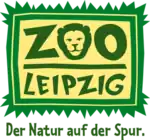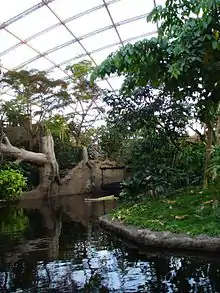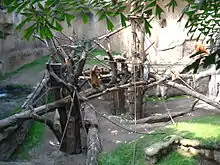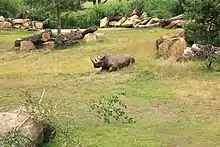Leipzig Zoological Garden
Leipzig Zoological Garden, or Leipzig Zoo (German: Zoologischer Garten Leipzig) is a zoo in Leipzig`s district Mitte, Germany. It was first opened on June 9, 1878. It was taken over by the city of Leipzig in 1920 after World War I and now covers about 27 hectares (67 acres) and contains approximately 850 species.[1] By 2020 the zoo featured six different theme worlds, aiming at providing habitats appropriate for the species on display.
| Leipzig Zoological Garden | |
|---|---|
 | |
 The main entrance | |
| 51.349°N 12.369°E | |
| Date opened | June 9, 1878 |
| Location | Pfaffendorfer-Strasse 29, Leipzig, Germany |
| Land area | 27 hectares (67 acres)[1] |
| No. of animals | 8077 (2019)[1] |
| No. of species | ~850 (2019)[1] |
| Annual visitors | 2 million (2011)[1] |
| Memberships | EAZA,[2] WAZA[3] |
| Website | www |
Leipzig zoo is internationally noted for its large building projects such as Pongoland (housing gorillas, chimpanzees, bonobos and orangutans) and Gondwanaland (world's second largest indoor rainforest hall at 1.65 ha or 4.1 acres).[4] It has bred more than 2,000 lions, 250 rare Siberian tigers, and other carnivores like bears.[5][6] Leipzig Zoological Garden has been called the "Zoo of the future".[7] It is ranked as the best zoo in Germany and also the second-best in Europe (after Vienna).[8][9]
Theme worlds
The Zoo Leipzig hosts six different theme worlds; the Founder's Garden, Gondwanaland, Asia, Pongoland, Africa and South America. Zoo director Prof. Dr. Jörg Junhold aimed to combine species conservation, with spacious compounds, which are as appropriate for the species kept within as possible. Additionally the zoo offers educational tours to visitor groups and various special events.
Founder's Garden
The Founder's Garden is located close to the entrance, partially in historical buildings. Besides the explorer's arch, which is also used for educational purposes this part of the zoo includes compounds displaying koalas since 2016 in the former ape house as well as a budgerigar aviary and primate islands.[10]
- Aquarium
- Bird wrasse
- Black arowana
- Blackspotted puffer
- Bluestreak cleaner wrasse
- Blue-girdled angelfish
- Bonnethead shark
- Chindongo saulosi
- Clown anemonefish
- Clown triggerfish
- Disk tetra
- Duckbill catfish
- Fire eel
- Kotsovato
- Longhorn boxfish
- Malawi hawk cichlid
- Mexican tetra
- Moon jellyfish
- Palette surgeonfish
- Rainbow shiner
- Smooth back river stingray
- Spotted garden eel
- Teardrop angelfish
- Tiger tail seahorse
- Weedy scorpionfish
- White-blotched river stingray
- Xingu peacock bass
- Yellow tang
- Yellowtail tang
Gondwanaland

In 2010 the massive greenhouse Gondwanaland opened comprising area larger than two football pitches (16.500 m2). It has its own tropical climate and hosts 170 exotic animal species and around 500 different plant species from Africa, Asia and South America. There is a treetop trail, with squirrel monkeys jumping around very closely. Visitors can also take a small open boat (for a small extra fee) to gain a different perspective.[11]
Another rare animal, living in Gondwanaland is the eastern quoll, medium-sized carnivorous dasyurid marsupial native to Australia [12]
- Mammals
- Birds
- African green pigeon
- African pygmy goose
- Allen's gallinule
- Bernier's teal
- Black crake
- Blue-throated piping guan
- Brahminy starling
- Brazilian teal
- Crested partridge
- Cuban grassquit
- Fulvous whistling duck
- Germain's peacock-pheasant
- Hartlaub's turaco
- Madagascar ibis
- Masked lapwing
- Nicobar pigeon
- Pied imperial pigeon
- Radjah shelduck
- Red fody
- Red-whiskered bulbul
- Sunbittern
- Turquoise tanager
- Victoria crowned pigeon
- White-crowned robin-chat
- Reptiles
- Amphibians
- File-eared tree frog
- Golden mantella
- Greenhouse frog
- Hong Kong whipping frog
- Mission golden-eyed tree frog
- Tomato frog
- White's tree frog
- Yellow stream frog
- Yellow-banded poison dart frog
- Fish
- Arapaima
- Atlantic mudskipper
- Australian lungfish
- Giant gourami
- Giant pacu
- Largescale four-eyes
- Red-bellied piranha
- Redtail catfish
- South American lungfish
- Spotted gar
- West African lungfish
- Invertebrates
Asia
One of the main attractions of this theme world are the Indian elephants. They have their own swimming pool, complete with a visitor gallery underneath, in case you make it there when the pool is opened to them, swimming elephants can be seen from below. The critically endangered Chinese pangolin – almost extinct in the wild – also inhabits this part of the zoo.[13]
Until they finally received an appropriate environment in 2017 the snow leopards lived in „traditional cages“ like the panther Rainer Maria Rilke wrote about in 1902.[14]
- Amur leopard
- Amur tiger
- Bali myna
- Black-headed ibis
- Carniolan honey bee
- Chinese pangolin
- Dalmatian pelican
- Eld's deer
- Eurasian harvest mouse
- Glossy ibis
- Gray slender loris
- Griffon vulture
- Hermit ibis
- Himalayan monal
- Indian elephant
- Indian pond heron
- Indian sloth bear
- Lowland anoa
- Pink-necked green pigeon
- Przewalski's wild horse
- Pygmy slow loris
- Red panda
- Rhesus macaque
- Snow leopard
- Southern three-banded armadillo
- Sri Lankan giant squirrel
- Swinhoe's striped squirrel
- Tufted deer
- Ural owl
- Visayan warty pig
- White-naped crane
- Woolly-necked stork
Pongoland

The modern ape-world with spacious outdoor facilities was opened in 2001 and allows four species of primates to live in family groups. Besides that it hosts a research centre in cooperation with the Max Planck Institute for Evolutionary Anthropology the Wolfgang Köhler Primate Research Center is situated in Pogoland, operating in collaboration with the Leipzig Zoo. The research focuses on both behavior and cognition of the four species of great apes: chimpanzees, gorillas (in this case western lowland gorillas), orangutans, and bonobos. There is a special focus on the ontogeny of chimpanzee cognition. When it was planned and constructed the Yerkes National Primate Research Center functioned as role facility for its creation.[15]
All of the primate species participate in the European Association of Zoos and Aquaria which is part of the EAZA Ex-situ Programme. Numerous young monkeys were born in Leipzig since Pogoland opened.[16]
Africa

One of the main attractions of the African area is the 25,000 m2 Kiwara Savannah, a shared habitat occupied by Grévy's zebras, Rothschild's giraffes, Thomson's gazelles, Nile lechwes and ostriches. Amongst the other animals are lions, hyena and the very popular meerkats.[17]
- African lion
- Ankole-Watusi
- Ansell's mole-rat
- Baringo giraffe
- Cape porcupine
- Common dwarf mongoose
- Eastern black rhinoceros
- Fat sand rat
- Grévy's zebra
- Grey crowned crane
- Lesser flamingo
- Nile lechwe
- Okapi
- Patas monkey
- Scimitar-horned oryx
- Short-eared elephant shrew
- Slender-tailed meerkat
- Southern cheetah
- Southern ostrich
- Spotted hyena
- Thomson's gazelle
- Petting kraal
South America
This area is scheduled to be redesigned to host a South American landscape with a large aquatic habitat will be opened for seals and penguins. Guanacos, flamingos and Chacoan peccaries are amongst the inhabitants (before reconstruction).[16]
Other animals
- Mammals
- Birds
- Asian fairy-bluebird
- Black bulbul
- Black-naped fruit dove
- Blue-crowned hanging parrot
- Blue-crowned laughingthrush
- Blue-headed quail-dove
- Brazilian tanager
- Cinnamon ground dove
- Citron-crested cockatoo
- Crimson-bellied parakeet
- Edwards's pheasant
- Lord Derby's parakeet
- Military macaw
- Montserrat oriole
- Purple-naped lory
- Rainbow lorikeet
- Red-legged honeycreeper
- Sclater's crowned pigeon
- Spotted thick-knee
- Sunset lorikeet
- Violaceous euphonia
- Violet-backed starling
- White-headed buffalo weaver
- White-rumped shama
- Yellow-crowned bishop
- Yellow-crowned gonolek
Gallery
 Entrance to the aquarium
Entrance to the aquarium Baja blue rock lizard
Baja blue rock lizard.jpeg.webp) Tiger family
Tiger family
.jpg.webp) Young gorilla having lunch
Young gorilla having lunch Meerkats
Meerkats Gondwanaland from above (white hall)
Gondwanaland from above (white hall).jpg.webp) Giraffes
Giraffes.jpg.webp) Eastern blue-tongued lizard in the terrarium
Eastern blue-tongued lizard in the terrarium
Notes
- Zoo Leipzig. Zoo Historie
- "EAZA Member Zoos & Aquariums". eaza.net. EAZA. Retrieved 19 February 2011.
- "Zoos and Aquariums of the World". waza.org. WAZA. Retrieved 19 February 2011.
- Marcopolo.de (31 October 2011). Deutschland: Eröffnung der Tropenerlebniswelt „Gondwanaland“ im Zoo Leipzig.
- Leipzig Zoological Garden. (2005). Encyclopædia Britannica. Retrieved December 8, 2005, from Encyclopædia Britannica Premium Service http://www.britannica.com/eb/article-9047693
- www.leipzig-sachsen.de, Letzel Media Leipzig. "" ZOO LEIPZIG • Fotos, Veranstaltungen, Öffnungszeiten, Tickets & Preise "".
- "Zoo der Zukunft". merian.de.
- "Neue Rangliste: Der beste Zoo Deutschlands liegt in Sachsen! | Blick - Sachsen". www.blick.de. Archived from the original on 2022-01-26.
- "Ausgezeichnet! Zoo Leipzig ist bester Zoo Deutschlands".
- "Go for a walk through Founder's Garden". Zoo Leipzig. Retrieved 14 April 2021.
- "Discover three continents under one roof in Gondwanaland". Zoo Leipzig. Retrieved 14 April 2021.
- "Eastern quoll". Zoo Leipzig. Retrieved 14 April 2021.
- "Experience Asia so close". Zoo Leipzig. Retrieved 14 April 2021.
- "Zoo Leipzig: Schneeleoparden beziehen Himalaya (in German)". WKPRC. 7 July 2017. Retrieved 14 April 2021.
- "Wolfgang Köhler Primate Research Center". WKPRC. Retrieved 14 April 2021.
- "Check out our closest relatives in Pongoland". Zoo Leipzig. Retrieved 14 April 2021.
- "Roam the endless plains of Africa". Zoo Leipzig. Retrieved 14 April 2021.
External links
 Media related to Leipzig Zoo at Wikimedia Commons
Media related to Leipzig Zoo at Wikimedia Commons- Official website